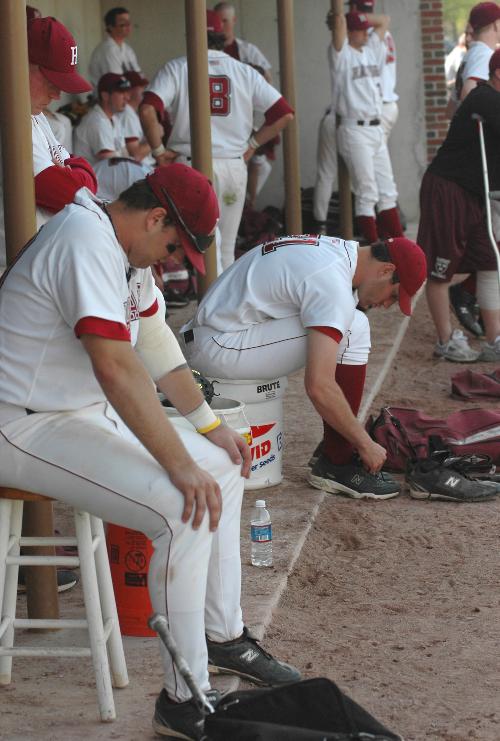
News
When Professors Speak Out, Some Students Stay Quiet. Can Harvard Keep Everyone Talking?

News
Allston Residents, Elected Officials Ask for More Benefits from Harvard’s 10-Year Plan

News
Nobel Laureate Claudia Goldin Warns of Federal Data Misuse at IOP Forum

News
Woman Rescued from Freezing Charles River, Transported to Hospital with Serious Injuries

News
Harvard Researchers Develop New Technology to Map Neural Connections
SIDEBAR: Stunned Crimson deals with disappointment, loss as 2005 Ivy Championship becomes a distant memory

On Saturday afternoon, twenty-nine baseball players stared out onto an empty diamond. Twenty-nine minds silently replayed a loss, a mistake, a possibility, a memory.
Harvard never thought that its year would end like this. For a team that routinely manufactured comebacks and blowouts, a sweep seemed too inconceivable, too swift and unceremonious for the guys who went a league-best 14-6 in Ivy play.
But in the stark emptiness of O’Donnell Field—bases uprooted, Princeton’s players gone, only a few kids running around the grass after the game—there it was, cruelly juxtaposed against the shining sun and chirping birds: a finish line.
Seniors Morgan Brown, Matt Brunnig, Javy Castellanos, Mike Dukovich, Josh Klimkiewicz, Chris Mackey, and Lance Salsgiver were in no rush to leave. Some knelt with tears in their eyes; some knew that this was the last time they would ever pick up a bat or glove in a meaningful game.
In baseball, a sport often reduced to sheer statistics, here was emotion. Here was Joe Walsh, sitting alone on the top bench of his dugout, arms crossed and head down.
“Some days, that’s what happens,” he said, turning over the last five hours in his mind. The venerable head coach spoke solemnly, like a man finally coming to terms with a tough breakup.
In a way, he was.
In baseball, language is a funny thing. “Some days, that’s what happens” is a simple, mundane line, arguably the linguistic equivalent to “He’s just not that into you.” It takes some time to accept, but the phrase reflects resignation to something final and inflexible.
And in Walsh’s line of work—moreso than in other sports—things really just “don’t happen” quite a bit, especially in a short series with Princeton.
“It’s just a tough day. There was no turnaround point, there were no moves,” he said. “We weren’t even there in both ballgames at the end to try and do some things and be aggressive. We just had to sit back and hope we could find it.”
They never could. Matt Vance, Salsgiver, Klimkiewicz, and Steffan Wilson—the first four hitters in the Crimson lineup, and statistically the finest foursome in the Ancient Eight—went a staggering 3-for-33 on the day. Tigers starters Erik Stiller and Christian Staehely worked quickly, flummoxing them with a steady repertory of fastballs and off-speed stuff, the latter hitting the glove in every count.
“We had a good feeling we were going to come back,” Walsh said. “But you run into good pitching, that’s all it is...They just out-pitched us.”
When asked, Walsh didn’t have an explanation for the struggles of Shawn Haviland, the ace who had been sporting a 0.73 ERA in Ivy League play, nor Adam Cole, the precocious freshman who had fanned 11 Tigers in his Ancient Eight debut. A week after a 149-pitch, 10-inning masterpiece, Haviland gave up seven earned on 11 hits in the first game, while Cole faltered in a seven-run Princeton sixth during the nightcap, surrendering four runs on four hits.
“Haviland had a good fastball. I thought he didn’t have anything today that he didn’t normally have,” he said. “I thought Cole came out pretty good.”
Down big in both games, Walsh tried rallying the troops in his dugout. The previous weekend, the Crimson unleashed 14 runs on Dartmouth to break a 9-9 seventh-inning stalemate and win the Red Rolfe division title. Then on Wednesday, a huge ninth-inning rally downed Northeastern.
On Saturday, however, the floodgates stayed bolted shut.
“It’s a different feeling with your backs against the wall,” Walsh said. “The rhythm and flow changes, and you try to get it back in the dugout by saying, ‘Here we go.’ You try to get some key words in. But you’re going up there, and everyone’s trying to do too much.”
So there will be no trip to California for the NCAA Tournament like last year. There will be no ESPN coverage, no trophy. Joe Walsh’s long-standing dream of getting his Ivy League team to the College World Series will have to be iced for yet another year.
Sitting there on the top bench, though, watching his twenty-nine players stare holes into O’Donnell Field, Walsh’s thoughts were far closer to home than they were to Omaha.
“You feel for the kids going out the door,” he said. “That’s what makes it tough.”
In baseball, Walsh reiterated, sometimes things just don’t happen.
But no one can blame a guy for staring, thinking somehow that they would.
—Staff writer Pablo S. Torre can be reached at torre@fas.harvard.edu.
Want to keep up with breaking news? Subscribe to our email newsletter.
